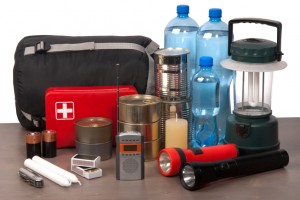Stockpiling for Disaster
 No one likes the idea of being in a disaster. People hate thinking about it. That’s where they get into trouble. If you aren’t thinking about it, then you aren’t preparing for it. If you aren’t preparing, then you won’t be surviving. Disasters can strike at any time. From natural disasters to man made attacks, you need to be ready to survive the hours, days, weeks and months that follow. A good way to be ready and prepared is by stockpiling certain items you need that might not be readily available or easily obtained afterward.
No one likes the idea of being in a disaster. People hate thinking about it. That’s where they get into trouble. If you aren’t thinking about it, then you aren’t preparing for it. If you aren’t preparing, then you won’t be surviving. Disasters can strike at any time. From natural disasters to man made attacks, you need to be ready to survive the hours, days, weeks and months that follow. A good way to be ready and prepared is by stockpiling certain items you need that might not be readily available or easily obtained afterward.
Bottled Water and Food
You need a large supply of food and water to ensure no worries about going hungry while waiting for things to get back to normal. Having a large #disasterstockpile of food and water is essential. Be aware that bottled water and canned food will expire. You can start saving and stockpiling now, but rotate the older items, eating and drinking them first so they don’t expire.
In addition to having massive quantities of water, consider getting a water filter to clean your own water in the event it takes longer for the world to right itself.
Dried and nonperishable food work well for stockpiling. Consider MREs (Meal-Ready to Eat). They can last a long time and although they don’t taste fantastic, they provide a good option for those who want to store a large amount of food in a relatively small space. They’re not inexpensive though and tend to cost between $45-$60 per case.
Pool water can be used for many things, including flushing the toilet if the water isn’t working. Have plenty of buckets on hand.
Gasoline and Propane
Be very careful storing gasoline for your car or generator. Don’t use the generator too close to the house and only in a well-ventilated area. We’ve all heard about families getting asphyxiated from carbon monoxide and dying because the generator was near a window, in the garage or some other non-ventilated area. Propane tanks work great to barbecue food.
Batteries and Flashlights
Be assured these items will be in short supply after a disaster. Having a large supply of extra batteries is a good idea, as well as having extra flashlights. Choose lights that take common batteries, as these are much easier to obtain. Have extra to pass out to neighbors who need them. Batteries can expire as well, so make sure you use the old ones and replace them with new ones. You can buy rechargeable batteries to recharge in your car.
Toilet Paper and Other Toiletries
Always make sure you have more than enough toiletries and toilet paper on hand to make things easier for you and others.
Medical Supplies
A first aid kit is essential. Extra bandages, peroxide and alcohol, sutures and over the counter medications can be picked up whenever you have the chance, then add them to your kit.
Ammunition
While many disasters will not require you to use ammunition, there’s no telling what could happen. If you’re left without help from authorities for any length of time, there’s always a chance of looters. You’ll want to make sure you have a way of dealing with them. Be very careful on this one as a lot of FEMA inspectors looked down the wrong end of a gun because someone had mistaken them as looters. I’m sure you’ve seen these signs, “YOU LOOT, WE SHOOT.” Using this sign is a lot safer than a gun.
The above are some of the most important items that you’ll want to stockpile to make it through any disaster.

No comments yet.